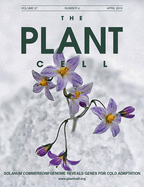- EN - English
- CN - 中文
EdU Based DNA Synthesis and Cell Proliferation Assay in Maize Infected by the Smut Fungus Ustilago maydis
在玉蜀黎黑粉菌感染玉米中进行基于EdU的DNA合成和细胞增殖实验
发布: 2016年03月20日第6卷第6期 DOI: 10.21769/BioProtoc.1761 浏览次数: 10294
评审: Marisa RosaPablo Bolanos-VillegasDennis Nürnberg
Abstract
The basidiomycetous smut fungus Ustilago maydis (U. maydis) infects all aerial parts of its host plant maize (Zea mays L.). Infection is seen in the form of prominent tumorous symptoms after the establishment of a biotrophic interaction with the host, usually around 5-6 days after infection. The fungus colonizes the various developmentally distinct aerial organs at different stages of development. Formation of tumors is coupled with the induction of host cell division. Activation of cell division can be understood as a measure of DNA synthesis which is triggered to induce rapid divisions in host cell. This developed protocol helps in tracking tumor induction in U. maydis by monitoring of DNA synthesis in planta. Infected leaves were treated with 5-ethynyl-2-deoxyuridine (EdU) at several stages of infection in the seedling leaves and labeled. EdU incorporation in the S phase cells, was visualized by attaching a fluorescent tag and non-dividing maize nuclei were stained with propidium iodide (PI). This protocol helped to understand the tumor development in U. maydis by confocal laser scanning microscopy (Kelliher and Walbot, 2011; Redkar et al., 2015)
Keywords: DNA Synthesis (DNA合成)Materials and Reagents
- 1 ml Syringes (Henke Sass-Wolff, catalog number: 5100.200V0 )
- Needles (16 G, 40 mm) (Premier Healthcare & Hygiene, BD microlance, catalog number: 300637 )
Note: A needle of different thickness can be used depending upon the maize variety. - Falcon tubes (15 ml)
- Microcentrifuge tubes
- Click iT EdU imaging kit (Life Technologies, catalog number: 10337 )
Note: Currently, it is “Thermo Fisher Scientific, Molecular ProbesTM, catalog number: 10337”.- 5-ethynyl- 2’-deoxyuridine (EdU)
- Wheat germ Agglutinin-Alexa Fluor 488 (WGA AF 488)
- Dimethylsulfoxide (DMSO)
- Click iT EdU reaction buffer
- Copper sulphate (CuSO4)
- Click iT EdU buffer additive
- Hoechst 33342
- 5-ethynyl- 2’-deoxyuridine (EdU)
- Phosphate buffer saline (PBS, pH 7.4) (Thermo Fisher Scientific, GibcoTM, catalog number: 10010023 )
- Permeabilization reagent [e.g. 0.5% Triton X-100 in PBS (Thermo Fisher Scientific, Molecular ProbesTM, catalog number: R37602 )]
- Bovine Serum Albumin (BSA) (Sigma-Aldrich, catalog number: A8531 )
- 100% Ethanol
- Propidium iodide (PI) (Thermo Fisher Scientific, Molecular ProbesTM, catalog number: P1304MP )
Note: PI is toxic and may cause skin and respiratory irritation. Hence it is good to handle PI in the fume hood with the personal safety protection. - Double distilled water
- 2% BSA in PBS (pH 7.4) (See Recipes)
- Propidium iodide stock solution (see Recipes)
Equipment
- EdU Labeling chambers
Note: These plastic chambers are custom made to fit in the desired sample). An image showing the details of this chamber is shown below (Figure 1B). As an alternative to the labeling chambers 50 ml Falcon Tubes can also be used to labeling the leaves by dipping the infected leaf in 10 µM EdU. - Confocal microscope (e.g. Leica Microsystems, model: TCS-SP5 )
- Vacuum Pump
- Rocker
Software
- Leica Imaging Software (Leica)
Procedure
文章信息
版权信息
© 2016 The Authors; exclusive licensee Bio-protocol LLC.
如何引用
Redkar, A. and Doehlemann, G. (2016). EdU Based DNA Synthesis and Cell Proliferation Assay in Maize Infected by the Smut Fungus Ustilago maydis. Bio-protocol 6(6): e1761. DOI: 10.21769/BioProtoc.1761.
分类
植物科学 > 植物免疫 > 病害生物测定
微生物学 > 微生物-宿主相互作用 > 体内实验模型 > 植物
分子生物学 > DNA > DNA 合成
您对这篇实验方法有问题吗?
在此处发布您的问题,我们将邀请本文作者来回答。同时,我们会将您的问题发布到Bio-protocol Exchange,以便寻求社区成员的帮助。
Share
Bluesky
X
Copy link















